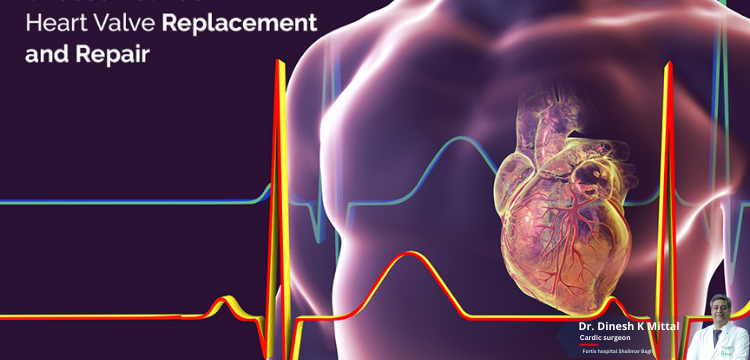Is Heart Valve Repair or Replacement a Major Surgery?

The aortic valve is one of four valves that control blood flow in the heart. It separates the lower left heart chamber (left ventricle) and the body’s main artery (aorta). When the heart squeezes (contracts), the aortic valve opens and lets blood flow from the left ventricle into the aorta. When the heart relaxes, the aortic valve closes to prevent blood from moving backward.
A diseased or damaged aortic valve can interfere with blood flow and force the heart to work harder to send blood to the rest of the body. Aortic valve repair or replacement can improve blood flow, reduce symptoms of heart valve disease, and prolong life.
Globally, millions of people are affected by heart valve diseases, leading to significant heart-related problems and even deaths. This blog aims to explain heart valve repair and replacement surgeries.
What is a Heart Valve Repair?
Heart valve repair fixes faulty heart valves, aiming to restore their function. It involves various techniques to mend valves affected by leaks or stiffening. Surgeons often opt for minimally invasive methods involving smaller incisions and quicker recovery.
This approach lessens pain and scarring while increasing success rates. Mitral, aortic, tricuspid, and pulmonary valves are frequently repaired. The primary goal is to fix valve problems, ensuring blood flows smoothly without leaks. Ultimately, heart valve repair seeks to improve heart function, reduce symptoms, and enhance the overall quality of life for individuals affected by valve issues.
What is Heart Valve Replacement?
Heart valve replacement involves swapping a damaged valve with a new one, often chosen when repair isn’t feasible. Two replacement valves exist:
- Mechanical (made of metal)
- Tissue (from animals or human tissue)
The surgical process for replacement is similar to repair but involves exchanging the problematic valve. Mechanical valves are durable but require blood thinners, posing clotting risks. Tissue valves don’t need blood thinners but may not last as long. Transcatheter aortic valve replacement (TAVR) is a less invasive option for select patients involving a valve placed through a catheter. It’s vital to weigh the risks and benefits when deciding on valve replacement.
What Are Heart Valve Conditions and How Do They Affect the Heart?
Heart valves act as gates in the heart, controlling blood flow. They ensure blood moves in the right direction and prevent backward flow. Conditions like stenosis (narrowing), regurgitation (leakage), and prolapse (abnormality) can disrupt this process.
Stenosis stiffens valves, reducing blood flow, while regurgitation causes leaks, leading to inefficient pumping. Prolapse occurs when valves don’t close tightly, allowing backward flow. These problems strain the heart, forcing it to work harder to pump blood, causing fatigue and breathlessness. Stenosis limits blood supply, while regurgitation affects blood distribution. Prolapse weakens the heart’s pumping action, causing irregular heartbeats.
Understanding these issues helps comprehend their impact: limited blood flow, inefficient pumping, fatigue, and breathlessness. It’s crucial to detect and manage these conditions early to maintain a healthy heart and avoid complications.
Dr. Mittal is an experienced heart surgeon known for repairing and replacing heart valves. He has performed more than 7,000 adult and pediatric cardiac surgeries, fixing problems like blockages in heart blood vessels and replacing or repairing valves like the aortic or mitral valves. He’s skilled in using advanced techniques to treat heart valve issues.
Are Heart Valve Repair or Replacement Considered Major Surgeries?
Heart valve repair or replacement is generally considered a major surgery. It involves fixing or replacing damaged heart valves to improve blood flow and heart function. Surgeons perform these procedures to correct issues like valve leaks or stiffness. During the surgery, the problematic valve is either fixed or replaced with a new one, aiming to restore proper blood circulation in the heart.
However, Dr. Mittal says, “While these surgeries are significant, they are essential for improving heart health and enhancing the quality of life for individuals with heart valve problems. Recovery from these surgeries might take time, but they significantly benefit those in need, allowing them to lead healthier lives with better heart function.”
What does the Surgical and Recovery Process Involve?
Surgical Process:
- Preparation: Patients undergo evaluations and discussions with the medical team before surgery.
- Procedure: Repair involves fixing the damaged valve, while replacement replaces the problem.
- Post-Operation: Patients receive specialized care after surgery to monitor recovery and manage complications.
Recovery Timelines:
- Hospital Stay: Patients generally stay in the hospital several days to a week post-surgery.
- Rehabilitation: Rehabilitation starts with gentle exercises to regain strength, gradually increasing activity levels.
- Lifestyle Adjustments: Post-surgery involves medication adherence, dietary changes, and regular follow-up appointments for monitoring.
Krati Agrawal thanked Dr. Dinesh Kumar Mittal for his successful surgery on her father. She said, “Dr. Mittal’s dedication and expertise extended her father’s life, giving her immense gratitude and appreciation. She feels thankful for the doctors’ efforts, for adding more precious years to her father’s life, making her highly grateful.”
Another patient’s family member, Rishi Chopra, expressed immense gratitude, saying, “I cannot thank you enough for the exceptional care you’ve given and for being a wonderful gift to my father, Surinder Nath Chopra. I feel blessed to have you as my doctor! Your expertise and care during the surgery gave us confidence and comfort. Thank you deeply for the excellent surgery and care you provided.”
Are there any Risks?
All surgeries have risks. Risks of aortic valve repair and replacement depend on your health, the type of procedure, and the expertise of the surgeons and other health care providers.
Aortic valve surgery should generally be performed at a center with an experienced multidisciplinary heart team that completes many such procedures to reduce potential risks.
Potential risks associated with aortic valve repair and aortic valve replacement surgery may include:
- Bleeding
- Blood clots
- Problem or failure of a replacement valve
- Heart rhythm problems (arrhythmias)
- Infection
- Stroke
- Death
How Much Does Valve Repair Or Replacement Surgery Cost in India?
Heart valve surgeries in India vary in cost due to factors like hospital reputation, surgeon expertise, and type of implant used. On average, the expense ranges between ₹1.5 lakh to ₹2.3 lakh or USD 6,000 to USD 12,000. Accessibility to these surgeries is essential. It’s crucial to have access to healthcare facilities that offer quality treatments at reasonable costs, ensuring that individuals in need can receive the necessary surgeries without facing financial hardships.
Conclusion
Heart valve repair or replacement surgery is an essential intervention for improving heart function and reducing symptoms caused by damaged valves. These operations are designed to restore appropriate blood flow by correcting disorders like leaks or stiffness in the heart valves. While they are considered significant procedures, they are essential in improving the quality of life for those who have heart valve disorders.
It is critical to comprehend the significance of these procedures, the healing processes, and the associated hazards. Getting personalized advice from healthcare specialists guarantees educated decisions and good heart health. Despite their intricacy, these operations benefit patients by fostering improved cardiac function and enhancing their general well-being.
Frequently Asked Questions
1. Can heart valve repair/replacement be done using minimally invasive procedures?
Yes, some heart valve procedures can be performed using minimally invasive techniques, leading to quicker recovery.
2. How long does recovering after valve repair/replacement surgery typically take?
Recovery time varies, but patients may take several weeks to a few months to fully recover and resume normal activities.
3. Do I need to take blood thinners after heart valve replacement with a mechanical valve?
Individuals with mechanical valves typically require lifelong blood thinners to prevent clotting.
4. Are there any dietary restrictions after heart valve surgery?
Generally, patients may need to follow a heart-healthy diet, but specific restrictions depend on individual cases.
5. Can heart valve problems recur after successful repair/replacement?
While successful surgeries often provide long-term relief, some valve issues may reoccur over time and might need monitoring or further treatment.
